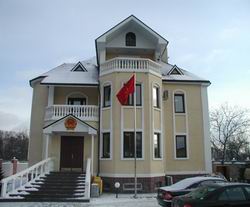Regulations on purchase of State-owned assets overseas
VGP – Any purchase of State-owned assets made by Việt Nam’s representative offices in foreign countries must be conducted in line with standards, norms and regulations of competent Vietnamese agencies.
The
regulation is stipulated in a newly-issued decree of the Government on
management and use of State-owned assets in foreign countries.

A
Vietnamese representative office in Ukraine – Illustration photo
The
decree rules that representative offices have to utilize State-owned assets in an
economical and effective manner.
Vietnamese
representative offices in foreign countries are required to make periodic
reports on their management and use of State-owned assets such as headquarters,
cars, and other items worth US $30,000 or higher.
With
the total purchase of or above US $10 million, representative offices have to
ask permission from the PM.
State-owned
assets comprise land, head offices, facilities associated with land, vehicles, devices,
machines, working equipment, and others.
By Khánh
Phương

